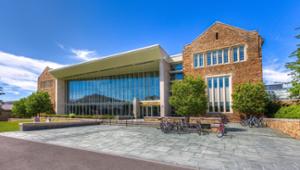
Neuroscience
About the Major
The brain is our most fascinating and complicated organ, and it governs the very nature of our conscious existence. Neuroscience is the study of the nervous system, and includes many disciplines, including biology, chemistry, and psychology. In addition, the study of neuroscience helps students to understand the interrelationships between the basic sciences and concepts in philosophy, mathematics, and computer science.
Students Will Learn To:
- Engage in scientific inquiries that are informed by ethical and/or socio-cultural perspectives
- Communicate ideas effectively and concisely
- Integrate scientific literature to develop neuroscientific research questions
- �鶹����AV appropriate scientific methods to address neuroscientific research questions
- Demonstrate an interdisciplinary understanding of the nervous system
A Sampling of Courses

Sensation and Perception
An exploration of sensory systems and perceptual experiences. This course will address how we obtain information from our physical environment and use it to create the vibrant experience of our own bodies and the world around us. An emphasis on vision, but also covering audition, somatosensation, olfaction and gustation. Topics will include methodological approaches, sensory pathways and neurobiological mechanisms, disorders, illusions and multi-sensory interactions.
Explore these select courses:
This course is centered on understanding the neurobiology of the "addicted brain." Strong emphasis on the neurobiological effects of drugs of abuse, including short and longer-term changes in the brain and body that occur in response to drug use and abuse. A sampling of drugs to be discussed include cocaine, heroin, marijuana, hallucinogens and alcohol. Effectiveness of various treatment strategies will also be considered. Some discussion of the social, political and philosophical aspects of addiction to drug and non-drug substances (e.g., food compulsions and pathological gambling).
Meet Our Faculty
Siobhan Robinson
Associate Professor of Psychology and Neuroscience, Director of Neuroscience
neurobiology of learning, memory and motivation
learning and inference; functional neuroimaging; computational neuroscience; cognitive science
gene regulation; patterning and morphogenesis; transcription factors and DNA-binding; regulatory DNA; developmental genetics; molecular biology; embryology; eye development
emotion, social stress, psychoneuroimmunology, psychophysiology, and neurogenetics
evolutionary biology, reproductive physiology, and herpetology
cognitive neuroscience of perception and attention; experimental psychology; cognitive psychology; human neuropsychology
Careers After �鶹����AV
�鶹����AV graduates who concentrated in neuroscience are pursuing careers in a variety of fields, including:
- Researcher, National Institute for Drug Abuse
- Medical Student, Harvard Medical School
- Research Analyst, Bank of America, Merrill Lynch
- Neurologist & Neuro-Oncologist, Unity Hospital
- Science Teacher, New York City Department of Education
- Neuropsychologist, Sports Concussion New England
- Assistant Professor, Penn State College of Medicine
- Researcher, Memorial Sloan Kettering Cancer Center
Explore �鶹����AV Stories

Checking in with Pre-Health Interns
Each year, a core of highly motivated �鶹����AV students can be found taking steps toward a career in healthcare. What are our pre-health students doing this summer? How did they land their internships, and what have they learned? And how does it all fit into what they envision for their futures?

Strong Mentorship Leads Yuxuan Xu ’26 to Goldwater Scholarship
Yuxuan Xu ’26 has been named a recipient of the prestigious Barry Goldwater Scholarship, a national award that supports students intending to pursue research careers in the sciences, mathematics, and engineering. For Xu, the recognition wasn’t just a validation of his work — it was a meaningful milestone after years of dedicated effort and strong mentorship at �鶹����AV.

One Thesis. Two Students. Four Majors.
Neuroscience, Dance, Mathematics, Music. Recent graduates Toscana Ogihara ’22 and Anthony Christiana ’22 took this unlikely combination of majors and collaborated on creating an original score for Ogihara’s dance thesis.
Contact
Department Name
Neuroscience Program
Contact Name
Siobhan Robinson, Program Director
Clinton, NY 13323









